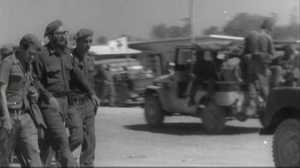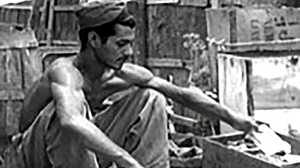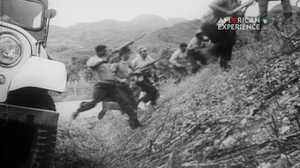Aran Shetterly is the author of the 2007 book The Americano: Fighting with Castro for Cuba’s Freedom. He allowed American Experience to excerpt a passage recounting the story of his conversations with two Rebel soldiers — Roger Redondo and Raúl Nieves.
In July of 2004, I met Roger Redondo, who had been a Rebel soldier with William Morgan. He agreed to let me interview him about the Second National Front of the Escambray. We met on Eighth Street in Miami's Little Havana. He lives in Costa Rica, enjoying the ease that comes with being away from the political pressures of Cuban Miami, and was in town visiting his mother and his doctor, fellow SNFE veteran Armando Fleites. Redondo didn't want to be interviewed in any of the Cuban joints, so we met at McDonald's. We sat outside on the playground, surrounded by purple slides and green swings, a virtual jungle of American consumerism, and talked about Cuba.
Redondo's voice is naturally quiet, and as I leaned in to listen to his stories I felt like a spy -- the unconventional meeting place; the hushed tones; the topic that still burns, after all these years, with an unresolved urgency. In the Otto Richter Library at the University of Miami, a librarian who was assisting me turned her back and walked away when I told her I'd interviewed Morgan's Rebel commander, Eloy Gutiérrez Menoyo. "My husband hates him," she hissed. "He's a Communist." Among the Miami Cuban Right, this is a common view of Menoyo and his friends in Miami and Washington, who, for the last ten to fifteen years, have favored dialogue with Castro as the best means for creating change on the island. I could understand why Redondo, as an associate of Menoyo's, preferred to meet out of the public eye.
After we had spoken for a time, going over dates and events and the people involved, Redondo said, "We (the SNFE) just had no one at the level of Fidel Castro. He was always a couple of steps ahead of everyone else. He is so smart. He knew more than the rest of us and could see further ahead than we could." To hear a Cuban in Miami pay Fidel Castro a compliment is rare, to say the least. Most Miami Cubans, or certainly the most outspoken ones, would call Castro "evil," "ruthless," a "megalomaniac," or any number of descriptors delineating someone pathological, even satanic. You can hear tirades of this sort every day on Miami talk radio.
To hear Fidel called "smart" and "brave," on the other hand, gave me pause. Many of the veterans of the Second National Front of the Escambray who live in Miami, it turns out, would say similar things about Castro. These were men who had lost so much because their group had threatened Fidel's omnipotence. What pains them most is the exile, the fact that they are living away from friends and family, away from home. Yet Redondo and others spoke of Castro without bitterness and with a touch of awe, though not because they support or agree with the way he runs the Cuban government. They spent time on the same revolutionary playing field as Cuba's leader, and they recall him as they would good baseball players who marvel at a great baseball player. They gave everything to the cause of a free Cuba. They put their lives on the line. In the end they were outmaneuvered, and they were willing to admit it.
After talking for more than two hours, Redondo began to tire. He has a heart condition that causes him pain and saps his energy.
Finally, he asked me a question: "Was Morgan with the CIA?"
I looked at this kind, smart man who had impressed me with both his memory and his persistence about getting things right, and I thought about what it must be to carry so many doubts about the facts of your own history. Redondo had met Morgan the day he arrived in the mountains. He fought with Morgan, partied with Morgan, worked with Morgan, and yet he, like so many others, remains unsure of his friend's motivations. Back in 1958 it would never have occurred to him that Morgan was an intelligence agent, but now he wondered.
During the summer of 2002, Comandante Raúl Nieves invited me to his duplex apartment across from the Malecón seawall and promenade in Havana to talk about the Escambray and the Revolution.
Nieves, in his seventies now, is a little hard of hearing, which may account in part for his revolutionary shout, a tone I encountered often among Cubans who find comfort in parroting reams of official history. It's like listening to a quarreling spouse who wants his entire argument to be heard uninterrupted, hoping that some incantatory power will make what he says unquestionable.
It’s also like Fidel Castro's impassioned discourses, which are ubiquitous on Cuban television. He's not just standing there, he's always talking, delivering long lectures that, for the most part, sound nothing like the "reasonable" political speeches to which we are accustomed in the United States. Fidel argues and defends, rants and chides. He pauses to fiddle with the microphones, collects himself for a particularly salient barb aimed at some aspect of U.S. policy. Then he bounces up onto his toes, cocks his head, rolls his Rs, points his finger, accusing and justifying. Regardless of what he's saying, his passion is impressive. The modulation of his voice and his body language persuade before the ideas have come to rest in the listeners' minds. It's great drama and it's on almost every day.
The revolutionary shout of other Cubans seems to imitate the tone of Fidel's conviction, often repeating something el Comandante en Jefe has said. Sometimes the speakers even reference their source, saying, for example, "As Fidel said about the French Revolution, . . ." While the imitators can reproduce the volume, they have trouble reflecting the passion and, since they are merely sourcing their information, when they finish what they can remember they often start over from the beginning.
Nieves gnawed on an unlit cigar and listened to the quick synopsis of my research. Then he disappeared upstairs and brought back his personal archive of photos, documents, and notes on the Revolution. He was planning a book, he said, one that would tell the true story of the Escambray.
As he shuffled his papers, Nieves ignored or didn't hear my first questions about the Second National Front of the Escambray. A rooster walked through the laundry room beyond the kitchen. The Comandante laid out black-and-white photographs from 1958, '59, '60, and '61. Photographs of the Rebel Nieves showed a man who looked like a young Robert De Niro, wiry, tough, and clearly loving the adventure of rebellion and revolution. "Faure Chomón," he said, identifying his commander and the leader of the D.R.E. "But who’s that?" I asked, pointing at an unnamed man beside Chomón. At first, Nieves ignored me, and I thought maybe he'd forgotten the man's name. I tried again. Finally, exasperated, he bellowed in a pitch-perfect revolutionary shout, "Traidor! -- Traitor!"
It soon became evident that only two categories of people existed: heroes and traitors. The heroes had names. The traitors didn't. "Who's that?" I'd ask. "Traitor!" he'd bellow. Misguided. Nothing good about them -- ever. Even the things they'd done in support of the Revolution before they became traitors were erased! They mattered only as a category of people to be eliminated, and as a foil to those who had remained loyal to Castro's Revolution.
Our conversation went on from there, question and deflection, parry and riposte, like a fencing match, each of us daring the other to expose a little more of what he knew.
"The Second National Front of the Escambray never fought in a single battle. When Faure Chomón arrived in the Escambray, he realized immediately that Menoyo and his companions were traitors. He denounced them and expelled them from the DRE.
"All they did," he continued in a loud monotone, "was eat the peasants' cows, chase the peasant women, and get fat."
That was it, the entire history of the SNFE according to Raúl Nieves. Over the course of our two hours, I heard this version several times.
As Nieves told me about "traitors" and "comevacas -- cow-eaters," I peered over his shoulder at the notes he flipped through as we talked. When he noticed my gaze, he turned slightly, as if to block my view, but he did not put the papers away. In the documents, I caught brief glimpses of lists of men who fought with the SNFE and charts detailing the SNFE's battles with the Cuban Army, battles that Nieves was telling me had never happened. The notes on Nieves's dining-room table, the ones he was allowing me to catch bits and pieces of, contradicted nearly everything he was telling me. On one list, next to almost every rebel victory in the Escambray was written the name of Morgan or Menoyo. I saw location names: La Diana, Charco Azul, Michilena, Linares, Hanabanilla, Río Negro. The list went on.
Was he trying to protect himself and give me information at the same time? Or was he careless? Nieves never strayed from the official talking point, that the SNFE were traitors and agents of the imperialists. I had nothing on tape that would compromise him.
When we finished the interview Nieves and his wife insisted on taking me to lunch. We went to an outdoor restaurant that catered to the Cuban elite and foreign diplomats. The three of us were whisked into a mobile, aluminum storage room that had been outfitted as a dining room for special parties. There were no windows. The air conditioning whirred and I shivered as the three of us ate alone in the room. Nieves had a glass of rum, his mood darkened, and I wondered at the personal toll his distortions had exacted.








